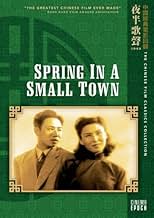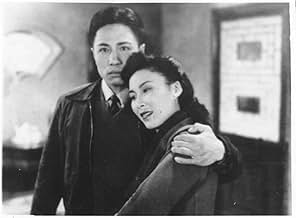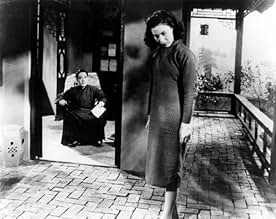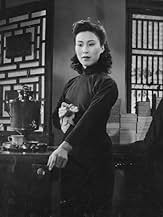IMDb RATING
7.3/10
3.6K
YOUR RATING
A lonely housewife finds her monotonous life altered when her childhood sweetheart returns to town.A lonely housewife finds her monotonous life altered when her childhood sweetheart returns to town.A lonely housewife finds her monotonous life altered when her childhood sweetheart returns to town.
- Awards
- 1 win total
- Director
- Writer
- All cast & crew
- Production, box office & more at IMDbPro
Featured reviews
If you are looking for a slice of life movie, look no further. A word of caution, however: this movie is a story, and a child of its time. There is no spectacular camera work, no epic soundtrack (or sound at all, for the most part), and certainly no special effects. Even the acting and dialogues are passable, at best. If you need any of these things to be immersed or even enjoy a movie, Spring in a Small Town is not for you.
There are four characters in the movie (and I mean four, there are no other supporting cast members or extras). The first two we are introduced are a couple, and they are "content". This is he best word to describe their situation, for they are not happy nor sad. You quickly realize that they have been frozen in time for years.
The conflict is created when an old friend (of both) comes back to town. This establishes the classic love triangle: the old friend has feelings for the wife, and she is torn between her own feelings towards him (or what she believes them to be) and those towards her husband.
There is little more to say about this movie without spoiling, except reiterate that this is a Chinese movie from the 40's. This is very much removed from the "factory assembled" plot lines that have plagued movies/books/video games/series for a long time.
If you were keeping track, the fourth character is the couple's caretaker, and he is a supporting character.
In the end, i still walk away with a lesson: no matter how much we think our life will stay the same, things will always happen. Whether they create change or not, is up to us.
There are four characters in the movie (and I mean four, there are no other supporting cast members or extras). The first two we are introduced are a couple, and they are "content". This is he best word to describe their situation, for they are not happy nor sad. You quickly realize that they have been frozen in time for years.
The conflict is created when an old friend (of both) comes back to town. This establishes the classic love triangle: the old friend has feelings for the wife, and she is torn between her own feelings towards him (or what she believes them to be) and those towards her husband.
There is little more to say about this movie without spoiling, except reiterate that this is a Chinese movie from the 40's. This is very much removed from the "factory assembled" plot lines that have plagued movies/books/video games/series for a long time.
If you were keeping track, the fourth character is the couple's caretaker, and he is a supporting character.
In the end, i still walk away with a lesson: no matter how much we think our life will stay the same, things will always happen. Whether they create change or not, is up to us.
After a long war with Japan, Chinese society in 1948 was ravaged by the destruction and the deaths of the seven straight years of the conflict. This movie perfectly depicts the depression of that era and the hopelessness in simple village-folk, while bringing a rather simplistic love triangle story-line at the forefront. Among the most important elements depicted are the internal monologues of Zhou Yuwen (Wei Wei), which narrate her life and bring a unique proto-feminist perspective within a society that was used to female subservience.
Film-making wise, noteworthy moments are the long walks along the ravaged (presumably by Japanese bombs) wall, as well as, the completely silent scenes that happen along the way, that add to the eeriness of the movie.
Film-making wise, noteworthy moments are the long walks along the ravaged (presumably by Japanese bombs) wall, as well as, the completely silent scenes that happen along the way, that add to the eeriness of the movie.
No other country suffered longer from the effects of war in the Twentieth Century than China, especially against Japan in its 1931 invasion of Manchuria all the way to the end of World War Two, losing millions of people. After WW2, China's film industry picked up the pieces, revitalizing its earlier 1930s 'Golden Era.' In the short time between the Japanese surrender in 1945 and the Communist takeover in 1949, China produced some of the country's most noteworthy movies, none greater, according to film historians and critics than April 1948's "Spring in a Small Town."
In a way, "Spring in a Small Town" draws parallels between China's post-WW2 and the county's cinematic hopes of regaining its position of producing the world's most prolific movie output. The Wenhua Film Company, based in Shanghai, which was known as the 'Hollywood of China,' was stablished to produce low budget dramas and intelligent comedies. Fei Mu, 41, a director since 1933, was hired by Wenhua Film, and assigned a script written by Li Tianji. The screenplay was pared down by Mu, who limited the picture to only four main characters, three of whom were members of a once wealthy family that saw their life savings and large mansion destroyed in the war. Husband Liyan (Shi Yu) is depressed about his situation, affecting his marriage with Yuwen (Wei Wei). Liyan's much younger sister Xiu (Zhang Hongmei), hasn't been as affected by the war as her brother, and is relatively cheerful, symbolizing the new, more optimistic next generation. Liyan's childhood friend Zhang Zhichen (Lu Wei) pays them a visit. His chipper personality sparks pleasant memories of Yuwen when the two used to date years ago. Meanwhile, teenager Xiu begins to get tingly over Zhichen, while Yuwen feels the same way, forcing Liyan to do something drastic.
In his essay on "Spring in a Small Town," Roderick Heath likened the Chinese movie to David Lean's 1945's "Brief Encounter." He wrote, "Both movies describe potential adulterous affairs, intensely personal, almost eventless tales all the better to unravel the tight wrapping on survivors of wartime, revealing the frustration wrought by subordinating personal desires to communal needs and faced with new choices completely at odds with the settled values all that fighting was supposed to defend and the habits of stoicism." The small window of Shanghai's independent film industry closed when the Chinese Nationals fled the country after facing the onslaught of Mao Zedong's Red Army in 1949. Director Fei Mu escaped to Hong Kong with other filmmakers before he died in 1951 at 45 from a heart attack while working at his desk. The victorious Communists felt Mu's movies were too right wing to show, and suppressed his work until the 1980s after the Cultural Revolution ended. With the reopening of the China Film Archives, the Chinese began to appreciate Mu's films, in particular "Spring in a Small Town." The Archives reconstructed a new print from the original negative, drawing scores of modern audiences worldwide to admire Mu's classic.
Many polls and lists include "Spring in a Small Town" as the Best Chinese Movie Ever Made, including the Hong Kong Film Critics, which in a 2010 poll voted the Mu movie the country's number one film. The Hong Kong Film Awards, equivalent to Hollywood's Academy Awards, selected it in 2005 as the top choice of the 100 Best Chinese Motion Pictures selected. It is included as one of '1001 Movies You Must See Before You Die.' A 2002 remake was produced, titled 'Springtime in a Small Town,' directed by Tian Zhuangzhuang, while a 2015 play created by the Chinese National Theatre under 1948's title retained the same names and the exact dialogue from the original picture.
In his essay on "Spring in a Small Town," Roderick Heath likened the Chinese movie to David Lean's 1945's "Brief Encounter." He wrote, "Both movies describe potential adulterous affairs, intensely personal, almost eventless tales all the better to unravel the tight wrapping on survivors of wartime, revealing the frustration wrought by subordinating personal desires to communal needs and faced with new choices completely at odds with the settled values all that fighting was supposed to defend and the habits of stoicism." The small window of Shanghai's independent film industry closed when the Chinese Nationals fled the country after facing the onslaught of Mao Zedong's Red Army in 1949. Director Fei Mu escaped to Hong Kong with other filmmakers before he died in 1951 at 45 from a heart attack while working at his desk. The victorious Communists felt Mu's movies were too right wing to show, and suppressed his work until the 1980s after the Cultural Revolution ended. With the reopening of the China Film Archives, the Chinese began to appreciate Mu's films, in particular "Spring in a Small Town." The Archives reconstructed a new print from the original negative, drawing scores of modern audiences worldwide to admire Mu's classic.
Many polls and lists include "Spring in a Small Town" as the Best Chinese Movie Ever Made, including the Hong Kong Film Critics, which in a 2010 poll voted the Mu movie the country's number one film. The Hong Kong Film Awards, equivalent to Hollywood's Academy Awards, selected it in 2005 as the top choice of the 100 Best Chinese Motion Pictures selected. It is included as one of '1001 Movies You Must See Before You Die.' A 2002 remake was produced, titled 'Springtime in a Small Town,' directed by Tian Zhuangzhuang, while a 2015 play created by the Chinese National Theatre under 1948's title retained the same names and the exact dialogue from the original picture.
Very interesting to get this glimpse into China in the short interval after WWII and before the communists won the Civil War. We see the fashions of the period pre-communism and a story decidedly not in keeping with social realism or rosy propaganda; instead, these characters have real angst and it's a human tale ala Madame Bovary. The devastation of the country is mirrored in the ruins of the town and in the illness of a man (Yu Shi) living with his increasingly estranged wife (Wei Wei). She's dutiful to him, but the pair are no longer intimate or even in love. Enter her old lover (Li Wei), a doctor who somehow slipped away from her a few years ago, and an illicit love triangle secretly begins simmering.
I loved the first half of the film, where the conflict and desire is told through glances and silences, and it wasn't clear what would happen. Complicating matters (in a good way) is the presence of a cheery 16-year-old sister who is also a possible love interest for the doctor. The film is a little creaky but director Fei Mu gives us some wonderful shots along the old city walls, the breeze fluttering through the grasses as the lovers stir each other's desires. The pace bogs down a little bit as the characters search for resolution to the struggle, with various contemplations of withdrawal, suicide, and even murder. The lovers also go through cycles which represents their torment, e.g. in a moment of passion the doctor whisking the woman off her feet and into his arms, and in the very next, putting her down, walking out the door and locking it. In all of the melodrama it seemed to me the story-telling wasn't as clean as it could have been, and I wasn't as swept up in the emotions of the ending as much as a result. It's interesting to think about the understated emotion and restraint here as it compares to 'In the Mood for Love' (2000) though, and the two films might make an interesting double feature.
I loved the first half of the film, where the conflict and desire is told through glances and silences, and it wasn't clear what would happen. Complicating matters (in a good way) is the presence of a cheery 16-year-old sister who is also a possible love interest for the doctor. The film is a little creaky but director Fei Mu gives us some wonderful shots along the old city walls, the breeze fluttering through the grasses as the lovers stir each other's desires. The pace bogs down a little bit as the characters search for resolution to the struggle, with various contemplations of withdrawal, suicide, and even murder. The lovers also go through cycles which represents their torment, e.g. in a moment of passion the doctor whisking the woman off her feet and into his arms, and in the very next, putting her down, walking out the door and locking it. In all of the melodrama it seemed to me the story-telling wasn't as clean as it could have been, and I wasn't as swept up in the emotions of the ending as much as a result. It's interesting to think about the understated emotion and restraint here as it compares to 'In the Mood for Love' (2000) though, and the two films might make an interesting double feature.
This is a film about deep and unspoken human relationships.
Eventually they do become spoken, but is there a chance to change anything about the situation.
Originally made in Shanghai 1948 and quite free of propaganda the film introduces us to the Dai Family. There is still some weight about the history that surrounds the family. History usually has weight in Chinese literature and serious film.
A young married couple - Liyan, an invalid, and his wife Yuwen live in a once great family compound that is partially ruined.
A bright contrast is Liyan's young sister who cannot really remember the past of the family but accepts everything in quite a natural way. Her spirit is as bright as the other two are reserved.
Into this apparently stable world comes an unexpected visitor...
I ended up feeling quite sad - but definitely a superior film.
Eventually they do become spoken, but is there a chance to change anything about the situation.
Originally made in Shanghai 1948 and quite free of propaganda the film introduces us to the Dai Family. There is still some weight about the history that surrounds the family. History usually has weight in Chinese literature and serious film.
A young married couple - Liyan, an invalid, and his wife Yuwen live in a once great family compound that is partially ruined.
A bright contrast is Liyan's young sister who cannot really remember the past of the family but accepts everything in quite a natural way. Her spirit is as bright as the other two are reserved.
Into this apparently stable world comes an unexpected visitor...
I ended up feeling quite sad - but definitely a superior film.
Did you know
- TriviaVoted the best Chinese-language film of all time by the Hong Kong Film Academy in 2004.
- Alternate versionsThere is an Italian edition of this film on DVD, distributed by DNA Srl: " PRIMAVERA IN UNA PICCOLA CITTÀ (Spring in a Small Town, 1948) + LA DEA (The Goddess, 1934)" (2 Films on a single DVD). The film has been re-edited with the contribution of film historian Riccardo Cusin. This version is also available for streaming on some platforms.
- ConnectionsFeatured in Venice 70: Future Reloaded: Zhangke Jia (2013)
- How long is Spring in a Small Town?Powered by Alexa
Details
- Release date
- Country of origin
- Language
- Also known as
- Proleće u malom gradu
- Production company
- See more company credits at IMDbPro
- Runtime
- 1h 38m(98 min)
- Color
- Sound mix
- Aspect ratio
- 1.37 : 1
Contribute to this page
Suggest an edit or add missing content

























